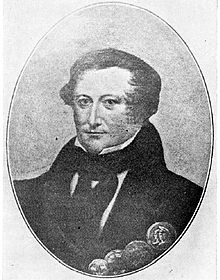James Marsh (chemist)
James Marsh ( September 2, 1794 - June 21, 1846 ) was a British chemist . He was a student of Michael Faraday .
Marsh worked as a chemist at the Royal Arsenal in Woolwich since 1822 ; from 1837 he was employed there in a leading position. There he invented, among other things, a time fuse for mortar grenades . From 1829 to 1846 he was also Faraday's assistant at the neighboring Royal Military Academy .
In 1836 he developed a method for the detection of arsenic in material mixtures ( Marsh's sample ). This discovery made it possible to detect arsenic in corpses, particularly in arsenic murder victims. His method can still detect 1 µg of arsenic. Marsh developed the improved method of arsenic detection after appearing as an expert witness in a murder case in 1833, but the accused was acquitted by the jury because his yellow arsenic trisulfide as evidence had disintegrated at the time of the trial.
He also invented an electrical oscillating circuit breaker. He received a silver medal from the Society of Arts for his development of the primer for naval guns ; he was awarded a gold medal by the same company for his arsenic evidence.
Fonts
- Account of a method of separating small quantities of arsenic from substances with which it may be mixed, Edinburgh New Philosophical Journal, Volume 21, 1836, pp. 229-236.
literature
- Allen G. Debus (Ed.) World Who's Who in Science Marquis-Who's Who, Inc .: Hannibal: Missouri, 1968
- Oxford Dictionary of National Biography Oxford University Press: Oxford, 2004
- JR Partington A History of Chemistry. Vol. 4 Macmillan and Co., Ltd .: London, 1962
- Stewart H. Webster: The Development of the Marsh Test for Arsenic, Journal of Chemical Education , Volume 24, 1947, pp. 487-490.
Individual evidence
- ↑ Blasius, Ewald., Jander, Gerhart .: Inorganic Chemistry. 1, introduction and qualitative analysis: with ... 79 tables. 17., completely reworked. Edition volume 1 . Hirzel, Stuttgart 2012, ISBN 978-3-7776-2134-0 , pp. 416 .
| personal data | |
|---|---|
| SURNAME | Marsh, James |
| BRIEF DESCRIPTION | British chemist |
| DATE OF BIRTH | September 2, 1794 |
| DATE OF DEATH | June 21, 1846 |
